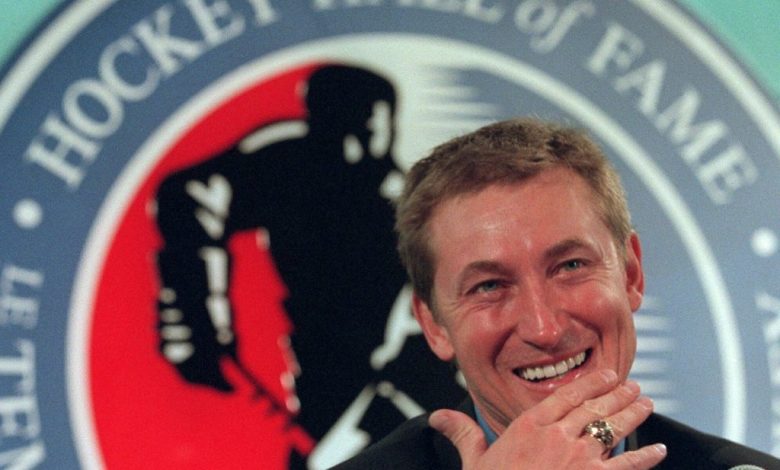Trump’s tariffs and statehood comments about Canada spark loyalty debate regarding NHL legend Wayne Gretzky’s relationship with his home country.

Wayne Gretzky, often regarded as the greatest hockey player of all time, is a name that resonates globally, especially within the Canadian psyche. As a native of Brantford, Ontario, Gretzky’s relationship with Canada is deeply rooted in national pride. His dominance on the ice, his cultural influence, and his leadership in sports have made him not only an icon of hockey but a national symbol. Yet, recent political events—specifically former U.S. President Donald Trump’s comments about tariffs and Canadian statehood—have ignited a wave of debate among hockey fans and pundits, questioning Gretzky’s loyalty to his home country, and by extension, his role in bridging the gap between the U.S. and Canada in terms of hockey culture.
While Gretzky’s legacy is inextricably tied to Canada, his later years, particularly in his post-playing career, have seen him become closely associated with the United States, leading many to wonder: where does Gretzky’s loyalty truly lie? Does the business side of his career, such as his association with U.S.-based teams and businesses, shift his allegiances? How does his response—or lack thereof—to controversial political statements regarding Canada affect his public image? This article will explore the complexities of Gretzky’s loyalty debate, touching on his historical ties to Canada, his connection with the U.S., and the political backdrop that has led to his involvement in these conversations.
1. Gretzky’s Legacy in Canada: The “Great One” as a National Icon
For Canadians, Wayne Gretzky is more than just a sports legend—he is a symbol of national pride. As the holder of numerous records in the NHL, including goals, assists, and points, Gretzky’s success on the ice transcended hockey itself. He is synonymous with excellence, and his success in the 1980s with the Edmonton Oilers brought hockey to unprecedented heights of popularity in Canada. At the height of his career, Gretzky was the face of the sport and represented the epitome of Canadian athleticism and national pride.
As a young player growing up in Ontario, Gretzky was already aware of the role he played in promoting Canadian sports. His humble beginnings, growing up in a country where hockey is not only a sport but a passion, made his eventual success even more profound. He became a national hero, transcending sports to become a cultural figure—a source of pride for a nation that prides itself on being the home of hockey. His trade from the Edmonton Oilers to the Los Angeles Kings in 1988 was viewed by many as a controversial move, not only because of the shock it caused within the sport but because it symbolized a shift in the global landscape of hockey.
Despite leaving Canada for Los Angeles, Gretzky’s connection to Canada never waned. His deep ties to the sport and the cultural importance of hockey in Canadian society kept him involved in the country’s hockey community. As a member of Canada’s Olympic hockey team and later as a member of Hockey Canada’s board of directors, Gretzky continued to serve as a public figure for the sport’s development in Canada.
2. The Shift to the United States: Business Ventures and Cultural Influence
However, as Gretzky’s career progressed, particularly in his post-playing years, his relationship with the U.S. grew more pronounced. His move to Los Angeles in the 1980s, long after his legendary playing days with the Oilers, marked the beginning of his deepening ties with the United States. At the time, the Kings were a team in need of a major boost to their stature in the NHL, and Gretzky’s arrival provided just that. The move was, in a sense, a realization of the growing cross-border appeal of hockey.
While Gretzky’s connection to Canada remained strong, the success of his time in California turned him into an international figure. His ventures into the world of business—including part ownership in the Phoenix Coyotes, his role as a spokesman for various companies, and his high-profile involvement with media—were all based in the U.S. Over time, Gretzky came to symbolize the perfect blend of Canadian hockey greatness and American commercial success. His brand transcended national borders, and in many ways, he became just as much an American sports icon as a Canadian one.
For many Canadians, however, this increasing alignment with U.S. companies, media, and institutions led to concerns over his connection to his home country. While Gretzky remained a public figure in Canada, critics of his U.S.-focused business interests began to question whether he had truly become more of an American figure than a Canadian one. Despite these growing ties to the U.S., Gretzky never publicly distanced himself from his Canadian roots, but this did little to quell the debate about his national loyalties.
3. Donald Trump’s Tariffs and Canadian Statehood Comments: The Political Backdrop
The situation became even more complicated when former President Donald Trump made a series of public comments regarding Canada that stirred political controversy. Throughout his tenure, Trump often voiced his discontent with Canada’s trade policies, particularly regarding tariffs on goods like steel and aluminum. His aggressive stance on trade and his tendency to make unorthodox political statements about foreign relations created a tense environment for U.S.-Canada relations.
However, Trump’s most controversial remarks came in the form of comments regarding Canadian statehood. In 2020, during a discussion about trade and the United States’ relationships with its neighbors, Trump made a joking yet inflammatory comment about the possibility of Canada becoming a state within the United States. This remark, though lighthearted in tone, struck a chord with Canadians who viewed it as an affront to their national sovereignty. For many, Canada’s identity as a country is deeply tied to its cultural autonomy, and Trump’s comments were perceived as dismissive of that autonomy.
These remarks set the stage for a broader discussion of what it means to be Canadian in the context of U.S.-Canada relations. In the midst of such heated political discourse, Gretzky’s silence on these issues drew significant attention. As a figure who has long been associated with Canadian pride, many expected Gretzky to speak out against Trump’s comments. However, his lack of public comment on the issue led to questions about where his true loyalty lay.
4. The Loyalty Debate: Is Gretzky Canadian or American?
As the debate about Gretzky’s political loyalties intensified, the question arose: is Wayne Gretzky still a loyal Canadian at heart, or has he become more of an American icon? His silence in response to Trump’s comments fueled this debate, especially given that Gretzky’s ties to both nations were undeniable.
On the one hand, Gretzky’s silence on political matters could be interpreted as a desire to avoid stirring controversy. As a businessman, public figure, and philanthropist, Gretzky’s comments could have had significant consequences for his business ventures in the U.S. His lack of public commentary could also be a reflection of the desire to maintain harmony in his professional and personal life. In a climate where the lines between political and personal identities are increasingly blurred, many public figures—especially those in the entertainment and sports worlds—choose to steer clear of divisive issues. Gretzky may have simply chosen to remain neutral to avoid alienating his fanbase in either country.
However, for many Canadians, the issue of national loyalty transcends politics. The question isn’t necessarily about political alignment; it’s about cultural and emotional ties to one’s homeland. Gretzky has long been a figure that embodied Canadian identity, and many feel that his silence on an issue that directly challenged Canada’s sovereignty and international reputation represents a disconnection from the very identity that made him famous in the first place.
5. Gretzky’s Response: Silence and Diplomacy
In a sense, Gretzky’s approach to these controversies was strategic and diplomatic. By staying silent on Trump’s tariffs and comments about Canadian statehood, he managed to avoid alienating either side of the debate. This quiet diplomacy, however, has left many questioning whether his detachment from the issue signals a shift in his priorities, particularly in light of his long-standing status as a Canadian icon.
It’s also worth considering that Gretzky’s influence is far broader than politics. As a transcendent figure in the world of sports, his legacy is rooted in his achievements on the ice and his role in growing the sport of hockey across North America. In this context, his legacy is not necessarily defined by his political beliefs but rather by his contributions to the sport and his role as a global ambassador for hockey.
6. The Impact of the Debate on Gretzky’s Legacy
Ultimately, the loyalty debate surrounding Wayne Gretzky does not diminish his legacy as one of the greatest athletes in history. Regardless of his political stances or where his true loyalty lies, Gretzky’s influence on the game of hockey and his status as a Canadian icon remain intact. His accomplishments, leadership, and the cultural impact he has had on both Canada and the United States are irrefutable.
However, the controversy surrounding his lack of comment on Trump’s remarks shows that even the most revered public figures are not immune to the complexities of national loyalty in the modern era. As Canada and the U.S. continue to navigate a politically charged landscape, Gretzky’s role as a symbol of national pride may be continually examined through the lens of current events and the shifting dynamics of international relations.









